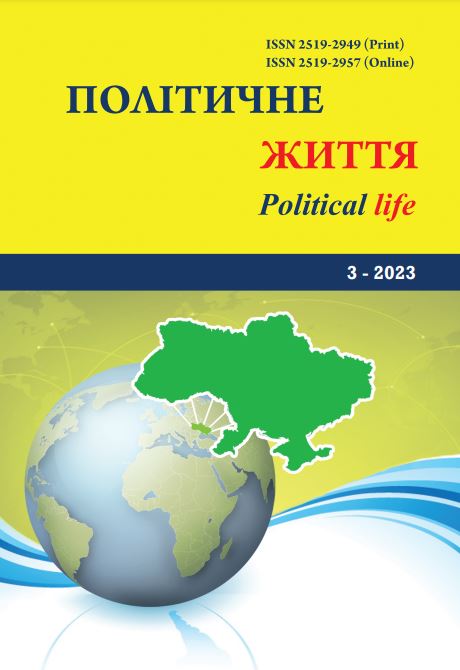Public policy as a factor of public opinion formation: significanance for contemporary party building
DOI:
https://doi.org/10.31558/2519-2949.2023.3.5Keywords:
public opinion; public policy; party system; Internet communications; institutional capacity; political transformations; democratic civic environmentAbstract
The article is devoted to the study of the public, which ensures the provision of priorities for state policy and forms the perception of government officials regarding the needs and demands of citizens. It was revealed that public opinion becomes the object of influence of media subjects who do not have a clear ideological, value or doctrinal identity. It is taken into account that for modern Ukraine in the conditions of a full-scale invasion of the Russian Federation, the question of compliance of the political and institutional structure with the requirements and needs of capacity and resistance is important. It has been proven that public opinion in a democracy will be formed on the basis of the real needs of society, which will be agreed upon in free democratic discussions. At each of these stages, political parties either qualitatively changed their own structure and integrated into the new political reality, or their structure underwent a decline, which consisted in party splits and subsequent absorption by more effective structures. The purpose of the article is to establish the importance of public policy as a factor in the formation of public opinion in the context of the development of the party system of modern Ukraine. Methods that are widely used in modern political sciences are used. In particular, it is about systemic, comparative, scenario and retrospective. As a result of the research, the issue of publicity in the political world is characterized by cultural and civilizational limitations and orientation to the practices of a democratic society. The proposed concept of a network party, or public organization, which will be built not as a part of an already existing party, but as a new political force based on engaged users of the worldwide network. Attention is focused on the increase of users of Internet networks, which leads to offers on the political market and may be of interest to certain political forces. It was determined that public discussion is a prerequisite for the direct management activity of the state. It has been proven that in the conditions of digitalization of political communications, parties are able to acquire the status of a mediator of a dynamic public environment and the institutional environment of public policy. It was concluded that public opinion should also acquire features of subjectivity in the form of parties, which will be delegated the functions of interaction with the public authorities on a permanent basis.
References
Багмет М. О. В. Т. Шатун Вплив громадської думки на визначення шляхів забезпечення національної безпеки України. Наукові праці [Чорноморського державного університету імені Петра Могили]. Сер. : Політологія. 2011. Т. 175. Вип. 163. С. 5-11.
Ващенко А. Громадянське суспільство та публічна сфера: контури теоретичного огляду. Evropský politický a právní diskurz. 2018. Sv. 5, Vyd. 5. С. 72-79.
Висоцький О. Ю. До питання про інформаційні технології легітимаційної політики. Бібліотекознавство. Документознавство. Інформологія. 2009. № 3. С. 44-50.
Кривошеїн В. В. Вплив "революції гідності" на політичну та правову культуру українського суспільства. Вісник Національного університету «Юридична академія України імені Ярослава Мудрого». Серія : Політологія. 2016. № 2. С. 37-58.
Матвієнко А. Публічна сфера в пострадянських суспільствах: умови і чинники розвитку. Науковий вісник [Одеського національного економічного університету]. 2014. № 2. С. 215-227.
Павлов Д. М. Громадська думка як об’єкт політичної пропаганди Грані.2013. № 12. С. 54-60.
Прасюк О. В. Громадська думка як суспільно-політичний феномен. Наукові записки [Національного університету «Острозька академія»]. Сер. : Культура і соціальні комунікації. 2010. Вип. 2. С. 246-255.
Рибачук О. М. Публічна політика як сфера реалізації сучасних соціально-комунікативних практик. Бібліотекознавство. Документознавство. Інформологія. 2018. № 3. С. 127-134.
Руженко Л. М. Сутність та підстави класифікації громадської думки. Актуальні проблеми політики. 2013. Вип. 50. С. 292-299.
Салманов А.Т. Суспільна думка як посередник між інститутами влади та громадянським суспільством. Наукові праці МАУП. 2013. Вип. 3. С. 74-78.
Сидоренко С. В. Розвиток громадянського суспільства в історії соціально-філоcофської думки: умови виникнення, сутність, структура. Гуманітарний вісник Запорізької державної інженерної академії. 2013. Вип. 54. С. 175-188.
Ярошенко В. М. Роль і місце громадської думки у процесі становлення інституту демократичної громадянськості в Україні. Наукові праці [Чорноморського державного університету імені Петра Могили]. Сер. : Політологія. 2013. Т. 212, Вип. 200. С. 146-150.

